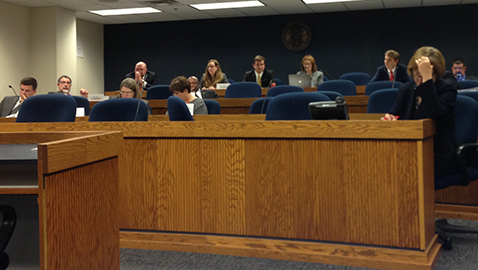By Ashley Jost
JEFFERSON CITY, Mo. — The saga continues in Missouri, just as it does across the country, as the debate about Medicaid expansion rolls on.

Last week, House Committee Substitute for House Bill 700, sponsored by Rep. Jay Barnes, R-Jefferson City, passed out of the Government Oversight and Accountability Committee with a 7-2 vote. Currently the main vehicle and focus in terms of Medicaid legislation, HB700 moves on to the Rules Committee, where it is not yet scheduled for a hearing.
Currently, with eligibility at 100 percent of the poverty level, HB700 doesn’t meet requirement for the federal expansion model, which requires 138 percent.
“We’re not going to increase our current Medicaid system beyond 100 percent of the poverty level,” Barnes told The Missouri Times. “That is the poverty level.”

When Gov. Jay Nixon spoke to the House Majority Caucus last week about HB700 as well as his wider-scope hopes for what he’d like to see the legislature do about Medicaid expansion, he reiterated to reporters his belief that the federal government cannot “live with” 100 percent. He said there are multiple avenues to get there, but they’ve been very clear that 138 percent is the ultimate non-negotiable to get the federal dollars.
“I truly don’t believe — and I don’t think anyone else believes — that we’re going to get a waiver for 100 percent,” House Minority Leader Jacob Hummel, D-St. Louis, told the Missouri Times. “[The Federal government] said that isn’t going to happen. So, how do we get to the 138 percent? Rep. Barnes knows the issues. Maybe he realizes we have to get to 138 percent and he’s looking at other solutions. I don’t know, but we have to get to that number.”
Just less than two weeks ago, the House bill list filled up with about 20 new bills — all versions of Medicaid expansion — filed by House Democrats.

Hummel said the filing of these 20-some bills was an attempt by the Democrats to ensure there were plenty of placeholders available in case any current legislation didn’t make it through committee so no one could say the fight was over.
During the coming weeks, Hummel said House Democrats plan to amend Barnes’ bill when it comes to the floor, and continue to put pressure on House members about the issue.
“We’ve come leaps and bounds,” he added. “The Speaker put out a letter not that long ago saying Barnes’ bill is a step in the right direction. At this point it doesn’t look like the House has as big of an issue with the idea of this legislation as they did before.”
During his weekly media availability, House Speaker Tim Jones, R-Eureka, told reporters he thinks HB700 is one way to make Medicaid better for Missourians, but said he thinks the House is “a long way from the finish line.”
Thomas McAuliffe, policy analyist for Missouri Foundation for Health, said while the Foundation would not take positive or negative positions on legislation, he thinks Missouri currently has a very unique opportunity.
“This is a once in a lifetime opportunity to get to the people who need it the most,” McAuliffe said.
McAuliffe said the legislature needs to think about this expansion from a pure policy perspective, and “look at what it does for the 877,000 uninsured Missourians.”
Part of McAuliffe’s job includes hosting community meetings — currently he said he has had about 210 on this issue — where people can ask questions and voice concerns. A recent concern he said he received was about why there were so many pieces of legislation dealing with the same issue.
“People are confused,” he continued. “That’s a problem. When the population is confused as to what’s being done for the rural hospitals and for the uninsured, that’s a problem.”
McAuliffe added that because the Missouri legislature has a Republican supermajority, the main vehicle to do anything about this issue will be through one of the Republican Party’s chosen avenues.
Sean Nicholson, executive director for Progress Missouri, said he thinks not expanding eligibility to 138 percent is missing a potential opportunity for the state, echoing Nixon’s concern about the federal government not providing waivers for anything less than what was previously stated.
“I don’t think anyone would say Rep. Barnes isn’t taking this seriously,” Nicholson added. “I know he’s trying to do the right thing to get this through to his caucus.”
Nicholson said Progress Missouri will continue to host activities — including a Medicaid rally at the Capitol next week — make phone calls, send out emails and schedule meetings with legislators.
Of the two “no” votes against HB700 during last week’s Committee vote, one came from Rep. Mark Parkinson, R-St. Charles, who said his concern is that implementing the legislation, even as is, would be a step closer to implementing the Affordable Care Act in the State, which he said he doesn’t think Missourians want.
Jones mentioned Parkinson during his Thursday media availability, saying Parkinson meant he couldn’t support the legislation because “we wouldn’t be in this situation but for Obamacare.”
“I couldn’t agree more,” Jones said. “We’ve kept a dialogue open on this issue. Missourians want us to make sure all their taxpayer dollars, whether we’re spending them on Medicaid, education, social services or highways, are done appropriately.”
To contact Ashley Jost, email ashley@themissourtimes.com, or via Twitter at @ajost.
Ashley Jost is no longer with The Missouri Times. She worked as the executive editor for several months, and a reporter before that.



